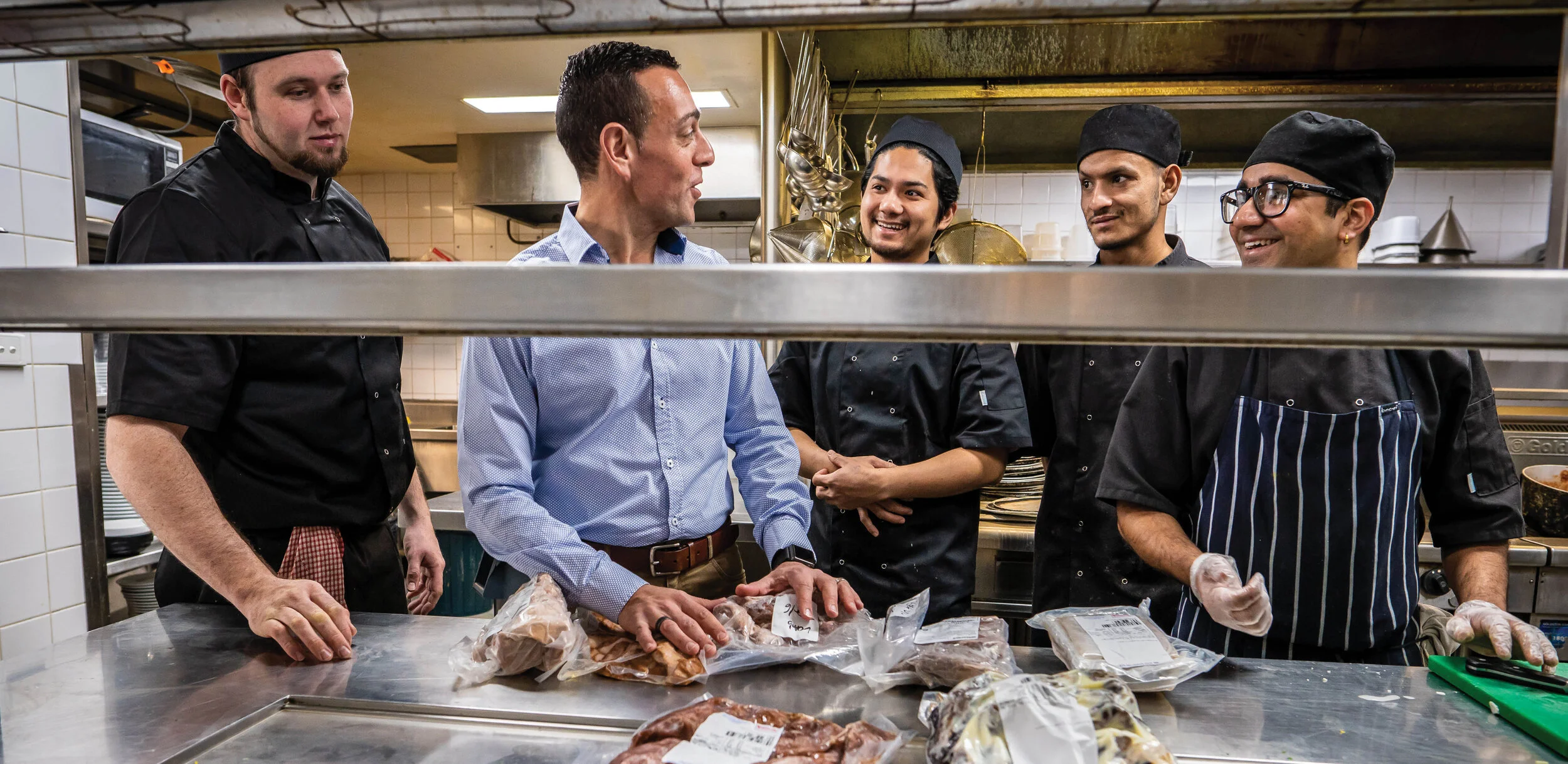Secrets of successful staff retention
It should go without saying that the success of your foodservice business is highly dependent upon the performance and dedication of your staff, both front and back of house. It’s not just the quality of the food and the ambience of the premises but the “service” part of foodservice which ensures customer satisfaction and keeps people coming back. Yet we’ve all been to foodservice venues where staff are obviously unhappy, stressed and pushed – service suffers as a result, and customers may remember the experience but not for the right reasons.
So we’ve sought some advice from two foodservice professionals who have long track records in managing and getting the best out of staff.
CHEF PETER WRIGHT
Having worked on major events and in stadiums throughout Australia and internationally, chef Peter Wright has spent much of his career overseeing large teams. He says his expertise in this area can be traced back to the solid grounding he received when working for a major catering company at the beginning of his career.
“They instilled the idea that training is a key driver for getting better performance, because obviously everyone is being upskilled there is continual improvement.”
“As a complement to that, it’s important to conduct regular performance appraisals as well as informal reviews with staff to find out how they’re feeling in the work environment. I used to hate the official performance appraisal process, which seemed to be filling out paperwork for the sake of it – but now I see it as an opportunity to provide some coaching and encouragement, and I think you should do it three or four times a year at least.”
“And you may think, ‘this person is a potential asset to my business that I don’t want to lose, but if they stay stuck in the same position too long I will lose them, so I should try to move them into another direction, one they might prefer.’ Everybody likes to have some personal attention, everybody appreciates being given the chance to expand their new skillset – as long as what they can see value in what they’re learning. And everyone wants to feel valued in their job, whether it’s a two or 200 person operation.”
“When I run major events with four or five hundred staff, I can guarantee you I would talk to 150 to 200 people every day, asking them how they’re going, are they enjoying themselves? And if I get a negative response I'll take them aside and talk to them or their supervisors and encourage some dialog to work with this out. Because on any business scale, everybody’s as important as everybody else - if you remove the weakest link you just get a new weak link, so you have to train the weak link to be stronger.”
Position yourself as an employer of choice
Steve Sidd, Catering HQ
In his capacity as managing director of Catering HQ which runs the food offerings in eight clubs throughout Sydney, Steve Sidd has extensive expertise in workforce planning and management and is committed to staff training. He says Catering HQ’s HR division has been continuously recruiting post-COVID, but that “trying to find staff is really difficult across the board right now - everyone knows the industry’s suffering. Even though we currently employ 250 people, I would love to recruit another 120.”
Steve says an effective approach is to position oneself as an employer of choice, by which he means offering staff plenty of opportunity for progression.
“We strive to identify a clear pathway for them, both through training via an RTO and on the job, so they can upskill themselves and hopefully progress through the industry.”
“When I look at some of our best staff today, they came from right at the bottom of our ranks and have risen to run our venues – that’s certainly the case with one of our head chefs and venue managers.”
In light of this he’s recently introduced an inhouse training program -new employees go through an induction process which is broken down into five courses for front of house and five for back of house. Leadership training is also offered.
This is complemented by incentive programs like staff member of the month, with employees nominated via customer surveys and ‘secret shopper’ reports. Steve also strives to value-add what Catering HQ is able to offer staff through business partnerships – “we’ve recently aligned with Commonwealth Bank so that our staff can access free financial advice, even if they don’t hold an account there.
“There are places out there that really need to change with the times, and that involves staffing as well as what they’re selling over the counter.”
And it doesn’t just involve training staff – it needs to be a cultural change across the entire business from the top down. The managers should be out on the floor running the operation, training and mentoring staff and helping them excel through great customer service, not locked in an office somewhere in front of a computer – they shouldn’t even have an office!”
Don’t leave your employees in the lurch
Peter Wright makes the point that pushing staff too hard is another issue which many businesses need to address if they want to stay in business over the longer term: “I was out with a group of people on Friday night at a very busy bar and two of the staff hadn’t turned up because they were ill. Everyone was stressed and things were going wrong – and it must have cost that business thousands of dollars because customers kept leaving when they couldn’t get served, no one was clearing tables and it was a mess.
“So I spoke to the manager and he told me that the business was understaffed to begin with, so by having two staff short it meant that the staff who were there were really doing the work of four extra people.
“Those staff have been left in the lurch by their employer - they’re being worked too hard and once that happens two or three times a lot of people will understandably throw in the towel.
“As a business owner, you just can’t afford to make those kinds of mistakes on an ongoing basis – understaffing your bar or restaurant and making staff continually overwork themselves. ”
“If it happens once in a while, at the very least you need to acknowledge it and reward staff accordingly. You might give everyone an extra $50 so they say it was worth working a bit harder. But if it happens regularly and staff end up walking out, your business could be ruined in a month. Four bad weeks is all it takes in this environment right now!
“It’s important to encourage, coach, train – and not just what you have to do as an employer in order to meet compliance requirements. Being generally appreciate of the work people do goes a long way. My attitude has always been that you spend so many hours at work that there has to be some fun to it, some aspect of it you enjoy. As they say in The Castle, “it’s the vibe” – and there’s a lot to be said in that!”








